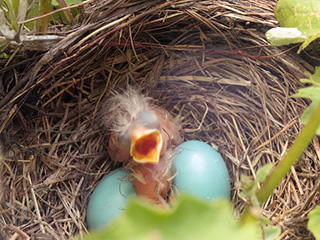Take Care of Baby Bird That Fell Out of Nest
When you come up across a helpless-looking babe bird out of its nest, it's difficult to resist the overpowering urge to come to the rescue.
→ But most of the time it's best to practise nothing. ←
Many birds that people try to rescue are still being cared for by their parents (even if you can't see them) and should be left alone.
Here's a primer on when to accept action for songbirds (baby ducks or geese require a different arroyo); when in incertitude, contact a licensed wildlife rehabilitator.
Found a baby bird?Wondering what to do? Check out our infographic > |
Assess for Injury
The start thing to do when you find a infant songbird is to figure out if it's injured. Baby birds tin can naturally expect weak, but if you meet blood or other obvious harm, contact a licensed wild animals rehabilitator.
You should also call a rehabilitator if you know a true cat attacked a bird; felines transmit deadly bacterial infections with even mild scratches.
Determine Age
Baby birds go through three stages:
- Hatchling (unremarkably 0-3 days old). It hasn't all the same opened its eyes, and may have wisps of downwardly on its body. It's not ready to get out the nest.
- Nestling (ordinarily three-13 days erstwhile). Its eyes are open, and its fly feathers may look like tubes because they've yet to break through their protective sheaths. It's also not prepare to leave the nest.
- Fledgling (13-14 days old or older). This bird is fully feathered. Its wings and tail may be short, and it may not exist a bully flyer, but it can walk, hop, or flutter. It has left the nest, though its parents may be nearby, taking good care of information technology.
Aid Hatchlings and Nestlings
If you find a hatchling or a nestling on the basis and yous can run across its nest, you lot should try to safely return it. Contrary to pop belief, birds do not have a well-developed sense of odor. Therefore, the parents won't know if a young bird has been touched by people and volition not abandon their immature.
If there's no nest, y'all can make ane by fastening a container to a branch. A modest basket is ideal, simply you can use a plastic container such as a margarine tub and punch holes through the lesser. Sides should exist no higher than 4 inches. Cutting two pieces of wire to eighteen-inch lengths and thread them upwardly through the bottom of the container and down again. Deeply wire information technology to the top of a branch in the aforementioned tree or shrub every bit the nest, and line the container with dry out grass. Place the bird inside the handbasket.
Give Fledglings Room to Grow
If yous discover a fledgling, the best grade of action is to leave it alone. Equally awkward as a fledgling bird may look, this is natural stage, and the parents are nearly likely nearby, hunting for nutrient and keeping watch. If the bird's in firsthand danger, you tin put it in a nearby bush-league or tree.
Don't Raise Baby Birds Yourself
It's illegal to bring a baby bird habitation and endeavor to raise it. Nigh immature birds won't survive if cared for past well pregnant but inexperienced people. Those that do survive will be at a disadvantage. They'll accept missed important lessons that they would have learned from their parents, such as how to find nutrient and water in the wild and how to avoid predators.
Protect Baby Birds from Cats
While all birds are threatened by outdoor cats, baby birds are especially vulnerable. Birds should never exist removed from the wild to protect them from cats or other predators. If in that location is a babe bird on the ground and a true cat nearby, put the cat indoors until the bird is able to fly. If the cat belongs to a neighbor, ask the owner to remove the true cat or, when the owner is not known, spray the cat with water to encourage it to exit the belongings.
Birds and the Law
Birds are protected by federal laws under the Migratory Bird Treaty Act (MBTA) of 1918 too as past Massachusetts state laws. Unless you're a licensed wildlife rehabilitator, it's illegal to proceed wild birds in your possession. The only exceptions are non-native species: Business firm Sparrows, European Starlings, and Pigeons.
Source: https://www.massaudubon.org/learn/nature-wildlife/birds/baby-birds-out-of-the-nest


0 Response to "Take Care of Baby Bird That Fell Out of Nest"
Post a Comment